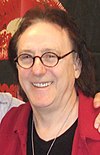List of the Moody Blues band members
Last updated
The Moody Blues were an English progressive rock band from Birmingham. Formed in May 1964, the group originally consisted of guitarist and vocalist Denny Laine, keyboardist and vocalist Mike Pinder, woodwind player and vocalist Ray Thomas, bassist Clint Warwick, and drummer Graeme Edge. The band remained active until late 2018, when sole constant member Edge retired from performing, at which point the lineup also included 1966 additions Justin Hayward on guitar and vocals, and John Lodge on bass and vocals. For their final few tours, the core trio were augmented by touring members Norda Mullen on flute, guitar and percussion (from 2003), Julie Ragins on keyboards, guitar, saxophone and percussion (from 2006), Alan Hewitt on keyboards (from 2010), and Billy Ashbaugh on drums and percussion (from 2016).
Contents
History
The Moody Blues were formed in May 1964 by Denny Laine, Mike Pinder, Ray Thomas, Clint Warwick and Graeme Edge. [1] The band debuted in September that year with the single "Steal Your Heart Away", which was followed a year later by their first album The Magnificent Moodies . [2] After a few more singles, the group faced its first change in personnel when Warwick left at the end of June 1966, claiming that his role was "keeping him apart from his wife and two small children too much". [3] Rod Clark replaced Warwick for three months, [4] before he and Laine left the Moody Blues at the beginning of October 1966, with Laine going on to pursue a solo career [4] and later joined Wings. Justin Hayward (formerly of Marty Wilde's band) joined on guitar and vocals and John Lodge (an early bandmate of Ray Thomas) joined on bass and vocals. [5]

The lineup of Hayward, Lodge, Pinder, Thomas and Edge remained stable for twelve years, releasing a string of successful albums including UK number-ones On the Threshold of a Dream (1969), A Question of Balance (1970) and Every Good Boy Deserves Favour (1971). [6] When Pinder refused to tour in promotion of the 1978 release Octave , he was replaced that October by former Yes keyboardist Patrick Moraz. [7] Pinder did not return after the tour, and later took legal action against the remaining members in an attempt to prevent them from releasing 1981's Long Distance Voyager under the Moody Blues name (which was unsuccessful). [8]
Starting in 1986, the Moody Blues began touring with an extended lineup, which initially included second keyboardist Bias Boshell, and backing vocalists Janis Liebhart and Wendy McKenzie. [9] Guy Allison took over from Boshell in 1987, [10] and in 1988 the backing vocalists were replaced by Shaun Murphy and Naomi Starr. [9] By 1990, Boshell had returned on keyboards, and Bekka Bramlett and Terry Wood had taken over backing vocal duties. [9] After the recording of the band's 14th studio albums Keys of the Kingdom in the spring of 1991, Moraz was fired from the band and credited on the release as one of the "additional performers". [11]
Moraz was not replaced in the band's official lineup. [12] Starting with the 1991 tour, Boshell took over as lead keyboardist, Paul Bliss was brought in as backup, and Susan Shattock and June Boyce took over on backing vocals. [13] In 1993, Tracy Graham replaced Boyce. [9] The group's touring lineup remained constant until April 2001, which marked the final appearances of Boshell and Graham. The pair were replaced by keyboardist and backing vocalist Bernie Barlow. [9] In December 2002, Ray Thomas announced that he would be retiring from performing, reducing the band's official lineup to the trio of Hayward, Lodge and Edge. [14]
Thomas was replaced in the Moody Blues touring lineup by flautist and guitarist Norda Mullen. [15] In 2003, the band released Christmas album December . [16] Julie Ragins replaced Barlow in 2006, after initially substituting for the keyboardist late the previous year. [17] Barlow took over for a year in 2009, before Ragins returned from 2010. [17] Also in 2010, Alan Hewitt joined the touring band as their second keyboardist. [18] Billy Ashbaugh replaced Marshall as second live drummer starting in 2016, with Edge primarily playing piano during live shows. [19] Ray Thomas died on 4 January 2018. [20] The group continued touring until Edge retired from performing at the end of 2018, although the possibility of a return was mentioned in interviews by Lodge. [21] On 11 November 2021, however, Edge died, marking the end of the Moody Blues. [22]
Members
Official
| Image | Name | Years active | Instruments | Release contributions |
|---|---|---|---|---|
| Graeme Edge | 1964–2018 (died 2021) [23] [21] |
| all Moody Blues releases | |
| Ray Thomas | 1964–2002 (died 2018) [23] [14] |
|
| |
| Mike Pinder | 1964–1978 (died 2024) [23] [7] [8] |
|
| |
| Denny Laine | 1964–1966 (died 2023) [23] [4] |
| all Moody Blues releases from "Steal Your Heart Away" (1964) to "Boulevard De La Madeleine" (1966) | |
| Clint Warwick | 1964–1966 (died 2004) [23] [3] |
| ||
| Rod Clark | 1966 [4] | "Life's Not Life" (1967) | ||
| Justin Hayward | 1966–2018 [5] [21] |
| all Moody Blues releases from "Fly Me High" (1967) onwards | |
| John Lodge |
| |||
| Patrick Moraz | 1978–1991 [7] [11] |
| all Moody Blues releases from Long Distance Voyager (1981) to Keys of the Kingdom (1991) |
Touring
| Image | Name | Years active | Instruments | Release contributions |
|---|---|---|---|---|
| Janis Liebhart | 1986–1987 [9] | backing vocals | none | |
| Wendy McKenzie | ||||
| Bias Boshell |
|
|
| |
| Guy Allison | 1987–1989 [10] | keyboards | none | |
| Shaun Murphy | 1988–1990 [9] | backing vocals | ||
| Naomi Starr | ||||
| Bekka Bramlett | 1990–1991 [9] | |||
| Terry Wood | ||||
| Gordon Marshall | 1991–2015 [19] |
|
| |
| Paul Bliss | 1991–2010 [13] |
|
| |
| Susan Shattock | 1991–2000 [13] | backing vocals |
| |
| June Boyce | 1991–1993 [13] [9] | |||
| Tracy Graham | 1993–2001 [9] | Hall of Fame (2000) | ||
| Bernie Barlow |
|
| Lovely to See You: Live (2005) | |
| Norda Mullen | 2003–2018 [15] |
|
| |
| Julie Ragins |
|
| Days of Future Passed Live (2018) | |
| Alan Hewitt | 2010–2018 [18] |
| ||
| Billy Ashbaugh | 2016–2018 [19] |
|
Timelines
Official members

Touring members

Lineups
| Period | Members | Releases |
|---|---|---|
| May 1964 – June 1966 [1] [3] |
|
|
| July – October 1966 [4] |
| none |
| November 1966 – October 1978 [5] [7] [8] |
|
|
| October 1978 – May 1991 [7] [8] [11] |
|
|
| May 1991 – December 2002 [11] [12] [14] |
|
|
| December 2002 – late 2018 [14] [21] |
|
|
Related Research Articles

The Moody Blues were an English rock band formed in Birmingham in May 1964. The band initially consisted of drummer Graeme Edge, guitarist/vocalist Denny Laine, keyboardist/vocalist Mike Pinder, multi-instrumentalist/vocalist Ray Thomas, and bassist/vocalist Clint Warwick. Originally part of the British beat and R&B scene of the early–mid 1960s, the band came to prominence with the UK No. 1 and US Top 10 single "Go Now" in late 1964/early 1965. Laine and Warwick left the band by the end of 1966, being replaced by guitarist/vocalist Justin Hayward and bassist/vocalist John Lodge. They embraced the psychedelic rock movement of the late 1960s, with their second album, 1967's Days of Future Passed, being a fusion of rock with classical music that established the band as pioneers in the development of art rock and progressive rock. It has been described as a "landmark" and "one of the first successful concept albums".

David Justin Hayward is an English musician. He was the guitarist and frontman of the rock band the Moody Blues from 1966 until that group's dissolution in 2018. He became the group's principal vocalist and its most prolific songwriter over the 1967–1974 period, and composed several international hit singles for the band.
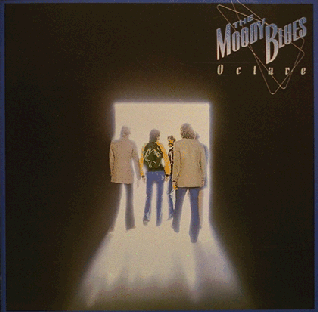
Octave is the ninth album by the Moody Blues, released in 1978, and their first release after a substantial hiatus following the success of the best-selling Seventh Sojourn in 1972. Released after a considerable break, which saw The Moody Blues returning in an era of punk music and disco, Octave produced a reduced commercial outcome for the band, but reached No. 6 in the United Kingdom and went platinum in the United States, where the album reached No. 13. The album produced the hit single "Steppin' in a Slide Zone", which hit No. 39 in the US, in addition to "Driftwood". The album's title is a musical pun: it references both the notion of an octave; and as a word derived from the Latin octavus it refers to this being the eighth album by this line-up of the Moody Blues.
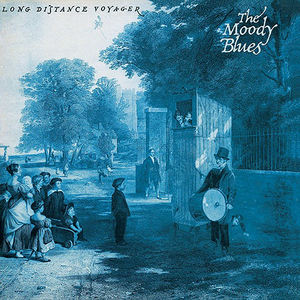
Long Distance Voyager is the tenth album by the Moody Blues, first released in May 1981 on the group's Threshold record label. It was the group's first album featuring keyboardist Patrick Moraz in place of co-founder Mike Pinder, who left after Octave in 1978.

Raymond Thomas was an English musician, singer and songwriter. He was best known as a founding member of the English progressive rock band the Moody Blues. His flute solo on the band's 1967 hit single "Nights in White Satin" is regarded as one of progressive rock's defining moments. In 2018, he was posthumously inducted into the Rock and Roll Hall of Fame as a member of the Moody Blues.

The Other Side of Life is the twelfth studio album by English progressive rock band the Moody Blues, released in April 1986 by Polydor Records.

Graeme Charles Edge was an English musician, songwriter and poet, best known as the co-founder and drummer of the English band the Moody Blues. In addition to his work with the Moody Blues, Edge worked as the bandleader of his own outfit, the Graeme Edge Band. He contributed his talents to a variety of other projects throughout his career. In 2018, Edge was inducted into the Rock and Roll Hall of Fame as a member of the Moody Blues.
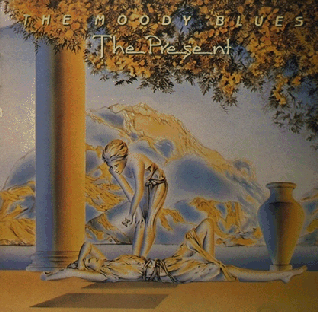
The Present is the eleventh album by the Moody Blues, released in 1983. This was the group's last original studio album to be released on their custom label, Threshold Records.

John Charles Lodge is an English musician, best known as bass guitarist, vocalist, and songwriter of the longstanding rock band the Moody Blues. He has also worked as a record producer and has collaborated with other musicians outside the band. In 2018, Lodge was inducted into the Rock and Roll Hall of Fame as a member of the Moody Blues.

Keys of the Kingdom is the fourteenth album by the rock band the Moody Blues, released in 1991. Although some of the tracks recall the songwriting on Sur la Mer, the failure of Keys of the Kingdom to produce any major hit singles would mark the beginning of the Moodies' decline in popularity with mainstream audiences after their success in the MTV video generation.

Caught Live + 5 is a live album by The Moody Blues, consisting of a 12 December 1969 live show at the Royal Albert Hall and five previously unreleased studio recordings from 1967 to 1968.
"Legend of a Mind" is a song by the British progressive rock band the Moody Blues, and was written by the band's flautist Ray Thomas, who provides the lead vocals. "Legend of a Mind" was recorded in January 1968 and was first released on the Moody Blues' album In Search of the Lost Chord. Prominently featuring the Mellotron, it was the first song recorded for the album.

"I'm Just a Singer (In a Rock and Roll Band)" is a 1973 hit single by the English progressive rock band the Moody Blues, written by the band's bassist, John Lodge. It was first released in 1972 as the final track on the album Seventh Sojourn and was later released as a single in 1973, with "For My Lady" as its B-side. It was the second single released from Seventh Sojourn, with the first being "Isn't Life Strange", which was also written by Lodge.
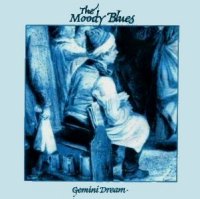
"Gemini Dream" is a song written by Justin Hayward and John Lodge that was released by The Moody Blues on their 1981 album Long Distance Voyager and also as the lead single from the album. It reached number 12 on the US Hot 100, as well as number 1 on the Canada RPM Top 100 Singles chart. It ranked as the 28th biggest Canadian hit of 1981.
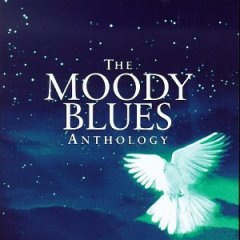
Anthology is a compilation album by the progressive rock band the Moody Blues. It was released in the US on 20 October 1998. It was not released in the UK until 2001 under the title The Collection with different artwork but with the same tracks as the US release.

"Driftwood" is a 1978 single by the English progressive rock band the Moody Blues. It was the second single released from the album Octave, after "Steppin' in a Slide Zone". Written by Justin Hayward, "Driftwood" is a slow love ballad, in a similar manner to "Nights in White Satin" and "Never Comes the Day."

Greatest Hits is a compilation album by the progressive rock band the Moody Blues, released in 1989. The band recorded new versions of "Isn't Life Strange" and "Question" with orchestration by the London Symphony Orchestra. The arrangements were overseen by Anne Dudley, who also produced the recordings with Justin Hayward and John Lodge. In 1990, only a year after its original release, the album was re-released as Legend of a Band: The Story of the Moody Blues with different artwork to coincide with the release of the home video documentary of the same name.

Live at the Isle of Wight Festival 1970 is a live album by the Moody Blues that consists of their live performance at the Isle of Wight Festival in 1970. The album was released in 2008.

Michael Thomas Pinder was an English rock musician. He was a founding member and the original keyboard player of the rock group the Moody Blues. He left the group following the recording of the band's ninth album Octave in 1978. Pinder was renowned for his technological contributions to rock music, most notably in the development and emergence of the Mellotron in 1960s rock music. In 2018, he was inducted into the Rock and Roll Hall of Fame as a member of the Moody Blues. He was the last surviving member of the group's original lineup.

Days of Future Passed Live is a live album by The Moody Blues that consists of their live performance at the Sony Centre for the Performing Arts in Toronto in 2017. The album was released on 23 March 2018.
References
- 1 2 3 4 Days of Future Passed Live (liner notes). The Moody Blues. Eagle Records. 2017. 0212749EMU.
{{cite AV media notes}}: CS1 maint: others in cite AV media (notes) (link) - ↑ Eder, Bruce. "The Magnificent Moodies – The Moody Blues: Songs, Reviews, Credits". AllMusic . Retrieved 15 January 2022.
- 1 2 3 "Bassist Clint leaves Moody Blues" (PDF). Disc and Music Echo . London, England: Disc and Music Echo. 2 July 1966. p. 6. Retrieved 15 January 2022.
- 1 2 3 4 5 "Denny Laine quits Moodies" (PDF). Record Mirror . No. 291. London, England: Record Mirror. 8 October 1966. p. 4. Retrieved 15 January 2022.
- 1 2 3 "Passings: Ray Thomas of the Moody Blues (1941 – 2018)". Vintage Vinyl News. 7 January 2018. Retrieved 15 January 2022.
- ↑ Eder, Bruce. "The Moody Blues Biography, Songs, & Albums". AllMusic . Retrieved 15 January 2022.
- 1 2 3 4 5 "Moraz Will Tour With Moody Blues" (PDF). Billboard . Vol. 90, no. 40. New York City, New York: Billboard. 7 October 1978. p. 72. Retrieved 15 January 2022.
- 1 2 3 4 "Pinder defeated" (PDF). Music & Video Week . London, England: Music Week. 23 May 1981. p. 1. Retrieved 15 January 2022.
- 1 2 3 4 5 6 7 8 9 10 11 12 "The Moody Blues Frequently Asked Questions List". Maggie Clarke Environmental. Retrieved 15 January 2022.
- 1 2 3 Allison, Guy. "Long Bio". Guy Allison . Retrieved 15 January 2022.
- 1 2 3 4 Ted (6 September 2016). "Art and Lawyers: The Case of The Moody Blues". Py Korry. Retrieved 15 January 2022.
- 1 2 Kampert, Patrick (11 July 1991). "The Moody Blues: Keys of the Kingdom (Polydor)". Chicago Tribune . Retrieved 15 January 2022.
- 1 2 3 4 Caro, Mark (11 August 1991). "Moody Blues Make Pretentiousness Pleasingly Palatable". Chicago Tribune . Retrieved 15 January 2022.
- 1 2 3 4 "The Moody Blues 2003 to present". Ray Thomas . Retrieved 15 January 2022.
- 1 2 Baver, Kristin (2004). "Norda Mullen: Living The Pipe Dream" (PDF). Higher & Higher. No. 46/47. pp. 46–49. Retrieved 15 January 2022.
- ↑ Jurek, Thom. "December – The Moody Blues: Songs, Reviews, Credits". AllMusic . Retrieved 15 January 2022.
- 1 2 3 4 Johnson, Danny (2 September 2018). "The Julie Ragins Interview... Music Schools Pay Attention!". speaktherights.com. Retrieved 15 January 2022.
- 1 2 "Interview with Alan Hewitt of the Moody Blues and One Nation – new single 'We're One Nation'". Darren's Music Blog. 29 March 2021. Retrieved 15 January 2022.
- 1 2 3 "Obituary – Graeme Edge Moody Blues". Pro Music News. 16 November 2021. Retrieved 15 January 2022.
- ↑ Daly, Rhian (7 January 2018). "The Moody Blues founding member Ray Thomas has died, aged 76". NME . Retrieved 15 January 2022.
- 1 2 3 4 "The Moody Blues' John Lodge launches US solo tour Saturday featuring special guest Jon Davison of Yes". ABC News Radio. 21 February 2020. Retrieved 15 January 2022.
- ↑ Kreps, Daniel (11 November 2021). "Graeme Edge, Moody Blues' Drummer and Co-Founder, Dead at 80". Rolling Stone . Retrieved 15 January 2022.
- 1 2 3 4 5 "Moody Blues stepping in a slide zone after rocking America for nearly 50 years". The Moody Blues. 2 June 2011. Retrieved 15 January 2022.
External links
Text is available under the CC BY-SA 4.0 license; additional terms may apply.
Images, videos and audio are available under their respective licenses.



